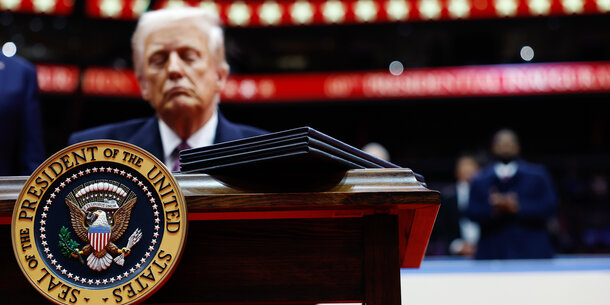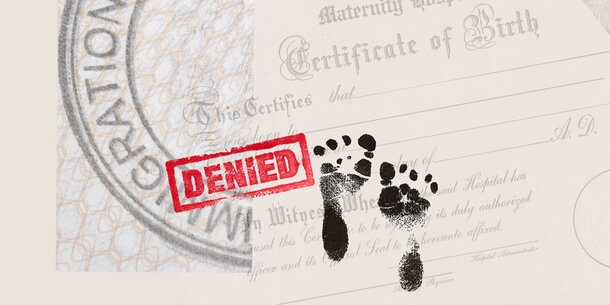The Supreme Court’s 2023 term saw the justices take up a wide array of high-stakes cases. Historians filed friend-of-the-court briefs in many of them, offering insights into the historical aspects of issues ranging from presidential immunity to gun control to racial gerrymandering.
To provide access to historians’ major contributions from this term in one place, the Brennan Center has prepared this annotated guide, which concisely summarizes the main arguments of briefs that focused on historical matters and featured at least one academic historian as a signatory.
To learn more about the Brennan Center’s efforts to respond to abuses of history in the courts, visit our regularly updated project page, which includes analysis of new judicial opinions and emerging legal trends, and the Historians Council on the Constitution home page, which collects the Brennan Center’s ever-expanding work with academic historians.
Trump v. United States
Fifteen founding-era historians filed a brief in Trump v. United States, a case centering on former President Trump’s claim to have immunity from criminal prosecution for trying to overturn the 2020 election. The brief, which argued against Trump’s assertion, explains that presidential immunity for criminal acts contradicts the founding generation’s rejection of monarchical privilege and distrust of the executive branch. The brief also argues that presidential immunity undercuts basic principles of American democracy. The opinion is available here.
Relentless v. Department of Commerce
Three legal historians filed a brief in Relentless v. Department of Commerce, a challenge to the constitutionality of the Chevron doctrine, a long-standing rule of judicial decision-making that grants federal agencies wide discretion to create rules. The brief, which supports Chevron’s constitutionality, describes a long history of federal courts deferring to agencies on legal questions. This history began in the founding era and continued well into the 20th century. The brief also shows that courts deferring to federal agencies’ interpretations of the law is consistent with the founding generation’s understanding of the separation of powers. The Court heard and decided Relentless with Loper Bright Enterprises v. Raimondo, a case that raised the same legal issue. The opinion is available here.
United States v. Rahimi
Eighteen historians and scholars of early American history and law filed a brief in United States v. Rahimi, a constitutional challenge to a federal law barring individuals under domestic violence restraining orders from possessing firearms. Their brief, which supports the constitutionality of the law, explains that there is a longstanding history and tradition of restricting “dangerous” individuals from possessing firearms, beginning with English common law and stretching into the 20th century. The brief shows that historically, laws disarmed individuals perceived as a threat to the peace and that the federal law at issue fits in that tradition. The brief also explains that there is a long history and tradition of domestic violence regulation dating back to the founding era. The opinion is available here.
Trump v. Anderson
The Supreme Court received multiple filings from historians in Trump v. Anderson, a case examining whether Section 3 of the 14th Amendment allowed a Colorado state court to remove former President Trump from the state’s 2024 presidential primary ballot. The opinion is available here.
Four historians of federal constitutional amendments, the laws of war, and the Civil War and Reconstruction, filed a brief arguing that the original intent, meaning, and public understanding of Section 3 supports Trump’s removal. According to the brief, Congress crafted Section 3 to ensure the republic’s security by disqualifying any individual who engaged in an insurrection against the Constitution, including any insurrection that might occur after the Civil War.
Twenty-five historians of the Civil War and Reconstruction filed a separate brief supporting Trump’s removal. The brief surveys the history surrounding the ratification of the 14th Amendment to argue that Congress intended Section 3 to serve as “an enduring check on insurrection,” including insurrection carried out by the sitting president. The brief also argues that Congress needed to take no further steps to implement Section 3 once it had been enacted.
A historian of the 20th Amendment also filed a brief supporting Trump’s disqualification. The brief argues that the original public meaning of that amendment does not prohibit states from disqualifying a candidate prior to an election.
Consumer Financial Protection Bureau v. Community Financial Services Association of America
Six scholars of constitutional law and early American history filed a brief in Consumer Financial Protection Bureau v. Community Financial Services Association of America, a constitutional challenge to the funding mechanism for the Consumer Financial Protection Bureau. The brief, which supports the constitutionality of the funding scheme, explains that the Appropriations Clause gives Congress alone the power to decide how agencies are funded. Drawing on the history of legislative appropriations beginning in England, prior to the American Revolution, and continuing through the 19th century, the brief concludes that Congress was exercising its constitutionally conferred authority when it designed the bureau’s particular funding mechanism. The opinion is available here.
Alexander v. South Carolina State Conference of the NAACP
Thirty historians and legal scholars of the American South filed a brief in Alexander v. South Carolina State Conference of the NAACP, a case involving the racial gerrymander of South Carolina’s congressional map. The brief, which supports the lower court’s conclusion that the map racially discriminated against Black voters, surveys the long history of racial discrimination in South Carolina politics aimed at diminishing the power of Black voters. It also positions the 2020 round of congressional redistricting as the latest instance in a recurring pattern of discrimination against Black voters dating to the Reconstruction era. The opinion is available here.
City of Grants Pass, Oregon v. Johnson
Eight legal scholars and historians filed a brief in City of Grants Pass, Oregon v. Johnson, a case concerning the constitutionality of a city’s law regulating camping on public property. The brief, which argues that the city’s law violates the Eighth Amendment, explains that the law differs in its purpose, scope, and structure from English and founding era vagrancy laws. In addition, the tradition of vagrancy laws contradicts modern understandings of liberty, equality, and decency, because such laws have been used historically to punish the poor and disfavored minorities, and, after the Civil War, to subjugate to former slaves. The opinion is available here.
Moody v. NetChoice and NetChoice v. Paxton
Seven scholars of history, journalism, and the First Amendment’s free press clause filed a brief in Moody v. NetChoice and NetChoice v. Paxton, a set of cases involving constitutional challenges to the editorial policies of social media websites. The brief, which supports the websites’ claims to have First Amendment rights to editorial discretion, examines the history of printers and press freedom. According to these scholars, social media sites’ discretion to determine what content to distribute today is analogous to the constitutionally protected discretion to publish enjoyed by printers, the press, and others during the founding era. The opinion is available here.
Securities and Exchange Commission v. Jarkesy
A historian of constitutional law and early America filed a brief in Securities and Exchange Commission v. Jarkesy, a constitutional challenge to the removal protections for the SEC’s administrative judges. The brief, which supports the constitutionality of the removal protections, explains that the original understanding of the president’s removal power was not unfettered. Rather, the history of pre-founding England and the early United States reveals that insulating executive officials from removal — like the SEC judges here — was understood to be consistent with the notions of executive power enshrined in the Constitution. The opinion is available here.
United States Department of State v. Muñoz
Eight immigration history and law scholars filed a brief in United States Department of State v. Muñoz, a case that considers whether the federal government’s decision to refuse a visa to a non-citizen spouse of a U.S. citizen impinges on that citizen’s constitutionally protected interests. This brief, which argues that a citizen’s right to petition for a noncitizen spouse is constitutionally protected, examines historical immigration policies to illustrate the nation’s long-standing commitment and deeply-rooted interest in family reunification. The brief explains that even in times of significant immigration restrictions, immigration policies made exceptions and granted special accommodations for immediate family members. The opinion is available here.
Moore v. United States
Nine scholars of tax law and legal history filed a brief in Moore v. United States, a constitutional challenge to Congress’s authority to tax unrealized income. This brief, which argues that the Constitution does grant Congress this power, examines relevant historical context relevant to understanding the meaning of “income” in the text of the 16th Amendment. It concludes, among other things, that the original meaning of “income” included unrealized gains, and that contrary precedent should be overturned. The opinion is available here.







